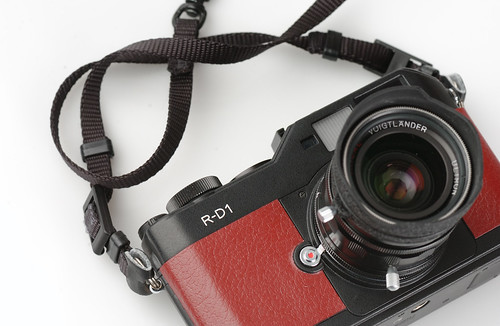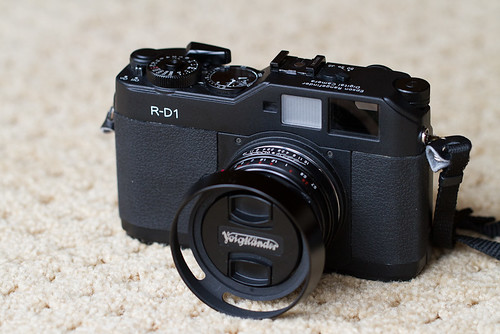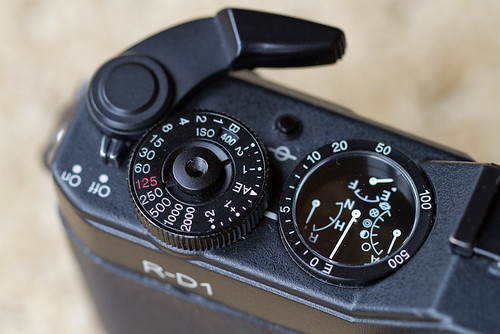Difference between revisions of "Epson R-D1"
m (→Links) |
(added mostly specs, describe needle display module and lens calculator) |
||
| Line 20: | Line 20: | ||
}} | }} | ||
|} | |} | ||
| − | The [[Epson]] '''R-D1''', based on the [[Cosina Voigtländer|Voigtländer]] [[Bessa (35mm)|Bessa]], is the first (2004) digital rangefinder camera ever made. | + | The [[Epson]] '''R-D1''', based on the [[Cosina Voigtländer|Voigtländer]] [[Bessa (35mm)|Bessa]], is the first (2004) digital rangefinder camera ever made. The body is made from magnesium alloy, it uses an EM mount which accepts [[Leica M lenses]] (bayonet mount) and, through the use of an adapter, [[39mm screw lenses|L (screw mount) lenses]]. A unique design choice is a ''shutter charge lever''. This resembles a typical film advance crank and is used to cock the camera after each exposure. |
| + | It uses a 6.3 million pixel [[CCD]] sensor. Images are captured in [[JPEG]] at 3008 x 2000 pixels, or a smaller size at 2240 x 1488. [[RAW]] format is also supported. It has an electronic vertical traveling [[focal-plane shutter]] with speeds from 1 to 1/2000s plus bulb. [[Flash sync]] is at 1/125 of a sec. For metering it uses a [[TTL]] [[center-weighted]] averaging meter. Exposure modes include [[aperture priority]], manual exposure, and AE lock. [[Exposure compensation]] is available ± 2 EV at 1/3 increments. ISO sensitivity can be set to 200, 400, 800 and 1600, by lifting up and rotating the collar surrounding the shutter dial. | ||
| + | |||
| + | The viewfinder has a 1.0x magnification with auto parallax correction. It supports 28mm, 35mm and 50mm lenses. The bright frames are manually selected on top of the camera body. The rangefinder base is at 37 mm. Half pressing the shutter button activates the metering. The viewfinder displays the current value of the selected speed, the flashing value is the suggested meter setting. | ||
| + | |||
| + | The screen is a 235K pixel TFT color [[LCD]]. It can be flipped out 90 degrees and rotated 180 degrees. Behind the LCD display is a lens calculator. Since the camera does not use a full 35mm frame sensor 28, 35 and 50mm lenses are equivalent to 42, 53 and 75mm lenses. An unusual feature is a ''Needle Display Module'' located by the shutter dial. It displays four needles one for image quality setting. R for RAW, H and N for JPEG size. Battery levels are indicated with a F (full) or E (empty). White balance uses A (auto) and other pictorial weather icons for sunlight, clouds, shade, incandescent and fluorescent. Surrounding the dial is a exposures remaining needle, it shows markings for 500, 100, 50, 20, 10, 5 and 0. Images are captured on to [[Secure Digital]] memory card. It is powered by a rechargeable lithium ion battery. | ||
| + | |||
| + | ===Epson R-D1s and R-D1x=== | ||
The model '''R-D1s''' from 2006 evidently used the same hardware but with some enhancements to the camera firmware. The 2009 Epson''' R-D1x''' revision adds support for [[SDHC]] cards, a larger 2.5" [[LCD]] and a detachable handgrip. | The model '''R-D1s''' from 2006 evidently used the same hardware but with some enhancements to the camera firmware. The 2009 Epson''' R-D1x''' revision adds support for [[SDHC]] cards, a larger 2.5" [[LCD]] and a detachable handgrip. | ||
== Links == | == Links == | ||
* [http://www.luminous-landscape.com/reviews/cameras/epson-rd1.shtml Early review of the R-D1] at [http://www.luminous-landscape.com/index.shtml Luminous Landscape] | * [http://www.luminous-landscape.com/reviews/cameras/epson-rd1.shtml Early review of the R-D1] at [http://www.luminous-landscape.com/index.shtml Luminous Landscape] | ||
| − | |||
{{Flickr image | {{Flickr image | ||
Revision as of 04:13, 8 May 2012
| ||
|
The Epson R-D1, based on the Voigtländer Bessa, is the first (2004) digital rangefinder camera ever made. The body is made from magnesium alloy, it uses an EM mount which accepts Leica M lenses (bayonet mount) and, through the use of an adapter, L (screw mount) lenses. A unique design choice is a shutter charge lever. This resembles a typical film advance crank and is used to cock the camera after each exposure.
It uses a 6.3 million pixel CCD sensor. Images are captured in JPEG at 3008 x 2000 pixels, or a smaller size at 2240 x 1488. RAW format is also supported. It has an electronic vertical traveling focal-plane shutter with speeds from 1 to 1/2000s plus bulb. Flash sync is at 1/125 of a sec. For metering it uses a TTL center-weighted averaging meter. Exposure modes include aperture priority, manual exposure, and AE lock. Exposure compensation is available ± 2 EV at 1/3 increments. ISO sensitivity can be set to 200, 400, 800 and 1600, by lifting up and rotating the collar surrounding the shutter dial.
The viewfinder has a 1.0x magnification with auto parallax correction. It supports 28mm, 35mm and 50mm lenses. The bright frames are manually selected on top of the camera body. The rangefinder base is at 37 mm. Half pressing the shutter button activates the metering. The viewfinder displays the current value of the selected speed, the flashing value is the suggested meter setting.
The screen is a 235K pixel TFT color LCD. It can be flipped out 90 degrees and rotated 180 degrees. Behind the LCD display is a lens calculator. Since the camera does not use a full 35mm frame sensor 28, 35 and 50mm lenses are equivalent to 42, 53 and 75mm lenses. An unusual feature is a Needle Display Module located by the shutter dial. It displays four needles one for image quality setting. R for RAW, H and N for JPEG size. Battery levels are indicated with a F (full) or E (empty). White balance uses A (auto) and other pictorial weather icons for sunlight, clouds, shade, incandescent and fluorescent. Surrounding the dial is a exposures remaining needle, it shows markings for 500, 100, 50, 20, 10, 5 and 0. Images are captured on to Secure Digital memory card. It is powered by a rechargeable lithium ion battery.
Epson R-D1s and R-D1x
The model R-D1s from 2006 evidently used the same hardware but with some enhancements to the camera firmware. The 2009 Epson R-D1x revision adds support for SDHC cards, a larger 2.5" LCD and a detachable handgrip.
Links

|
| with replacement leather image by Ivan Aguiar (Image rights) |

